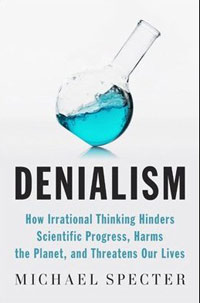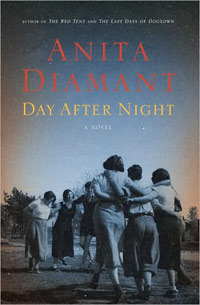Michael Specter and Anita Diamant to Speak
Both Authors Appear at UCSB this Week
IN DENIAL, BIG TIME: “Denial is something we all engage in from time to time,” explained New Yorker science and technology staff writer Michael Specter in an email Q&A with The Indy. Specter is the author of Denialism: How Irrational Thinking Hinders Scientific Progress, Harms the Planet, and Threatens Our Lives. On Monday, November 16, UCSB Arts & Lectures will bring him to town to talk about the theories, observations, and recommendations filling his new book. Specter considers “denialism” to be “society’s version” of the everyday denial to which we’re all subject-a scaled-up, more threatening version of the simple refusal to face facts. But it’s “broader and deeper,” he observed, “than anything that can be explained by poor education (though that matters) or dogma alone.”

That’s a scary prospect. “We are on the edge of some very exciting, but very scary discoveries in science and technology,” Specter went on, “the ability to create new forms of life among them. That frightens people, and not without reason.” This overpowering fear of the unknown has spawned, to Specter’s mind, a plague of willful ignorance, causing people to “dive into what they feel comfortable with and ignore hard scientific data. That is a natural thing to do, but it causes us to question some basic goods (like universal vaccination and the triumph of scientifically developed food sources) because we see them as ‘other,’ or dangerous. It is also a reason people seek alternative therapies and vitamins no matter how often they are shown to be of little or no value.”
“It is this retreat from reality that worries me,” Specter explained. Though he covers primarily scientific and technological issues as a journalist, Specter says denialism’s not contained within those sectors. “Denialists also seem to refuse to accept that Barack Obama is an American citizen, for example,” he wrote. “Anyone who refuses to accept compelling data and prefers to wallow in their own, often mystifying beliefs is a kind of denialist.”
Specter’s description of denialism-its ascendance, and the ill it has wrought-would seem to paint a grim picture of humanity’s future, but his book does not simply bemoan a rising tide of irrationality and un-empiricism; it also offers a number of strategies for how to counteract denialism by reviving the values of the Enlightenment and ushering in a new American age of reason. How realistic is it, though, to hold this hope? “Totally realistic,” Specter replied, providing examples of rationality’s victories even in this denialistic age: “We want to treat malaria, and an Enlightenment approach to creating synthetic medicine has made it possible. We want to cut carbon emissions-we can do much the same with new types of fuels. I refuse to accept that humans cannot march forward or that, in the end, they will refuse to. And of course all movements start with little steps. This one will be no different.”

STARTING OVER IN THE PROMISED LAND: Also from Arts & Lectures-in addition to the university’s Interdisciplinary Humanities Center and the Herman P. and Sophia Taubman Foundation Endowed Symposia in Jewish Studies program-historical novelist Anita Diamant visits on Thursday, November 12. Best known for her 1997 biblical novel The Red Tent, she’s now out in support of her brand new release Day After Night, which traces the paths of four young women who have survived the Holocaust but still face an uncertain future. Set in 1945, not long before the creation of the state of Israel, the book finds its protagonists in Atlit, a British-run Palestinian internment camp, where they meet and discover the shape of their rebuilt lives in a country struggling to build itself.
Both Specter and Diamant’s lectures take place at UCSB’s Campbell Hall, Specter’s at 7:30 p.m. and Diamant’s at 8 p.m. For more information about either event, call 893-3535 or visit artsandlectures.ucsb.edu.



